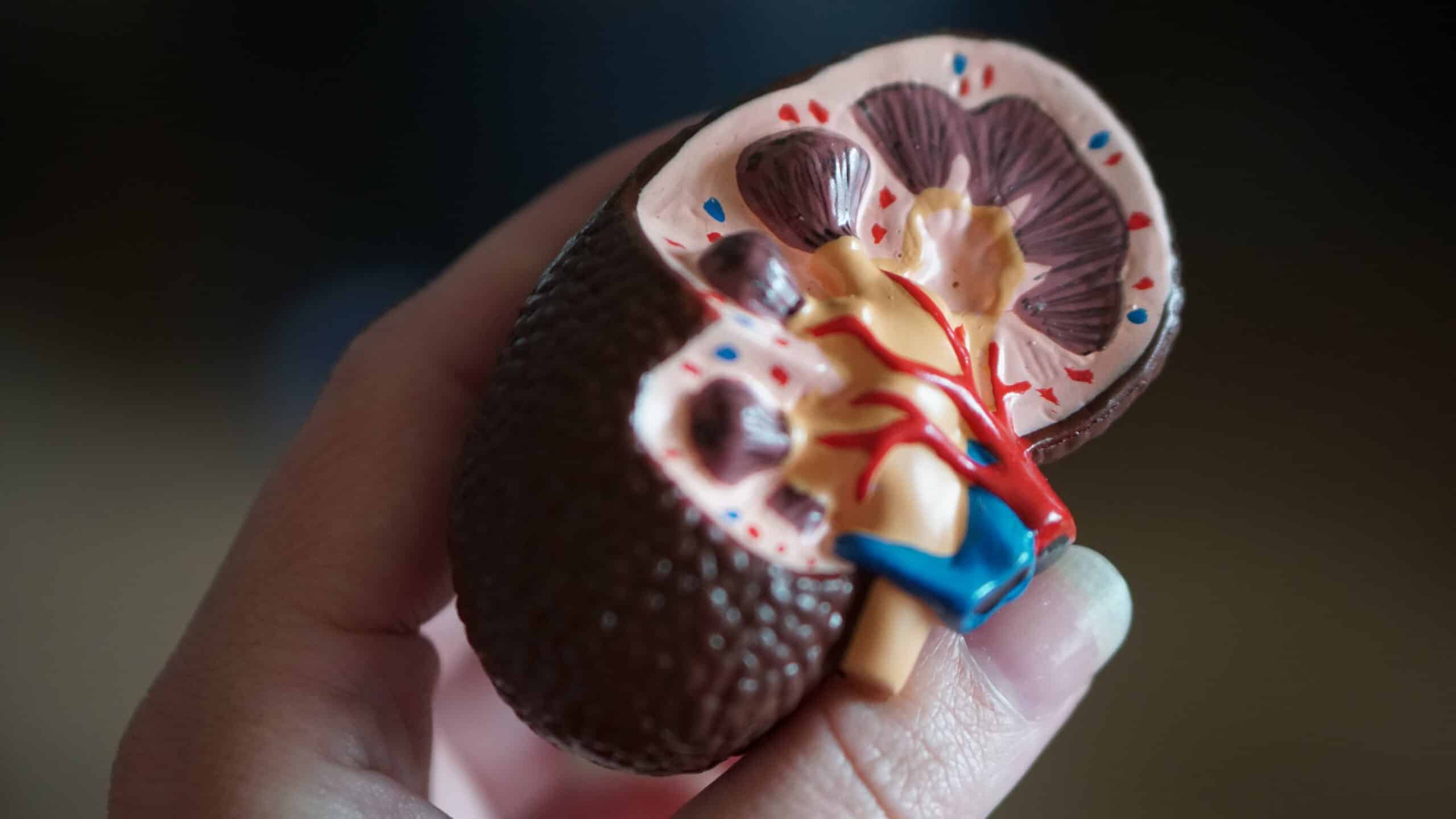Did you know that those with Crohn’s Disease are at higher risk of developing a kidney stone? There are many factors at play when it comes to Crohn’s and kidney stones including things like hydration and urine output. Keep reading to find out why and what you can do!
Everything you need to know about Crohn’s and Kidney Stones
Causes of Kidney Stones in IBD
Environmental conditions, hydration status, and urine output can all play a role in the development of kidney stones. A kidney stone is formed after it starts to crystallize from urine supersaturation, which is just the ratio of the concentration of dissolved salt to the solubility in urine.
People who develop kidney stones can experience blood in the urine, pain, nausea, and vomiting. In fact, the pain can be very debilitating. And some may also need to go to the ER for treatment and pain management. Kidney stones can be passed without intervention, but when it becomes difficult to pass a stone, intervention may be needed by a urologist.
There are many types of stones that can be presented during diagnosis. Oxalate stones are the most common seen in Crohn’s Disease. Oxalates can be higher for multiple reasons, including IBD, a high oxalate diet, and high vitamin C intake.
Calcium kidney stones are also prominent in Crohn’s Disease. Steroids, fat malabsorption, acidosis from diarrhea, and bowel resections can all lead to a calcium kidney stone.
Causes of kidney stones
- Urine supersaturation
- Low urine output
- High protein and sodium diet (mostly animal-based)
- Genetic components
- Environmental (hotter climates)
- Lower fiber diet
- Certain medications
Crohn’s and kidney stones
Kidney stones are the most common kidney related complication of IBD. Crohn’s Disease that affects the small intestine can decrease the body’s ability to absorb fat, which also increases the risk of developing kidney stones.
There are many different types of stones. However, Calcium oxalate (CaOx) stones tend to be the most common type of stone that presents in IBD. Causes for CaOx stones include consuming a high protein diet mostly from animal products, lower urine volume, low fluid intake, and decreased urinary citrate levels.
The most pressing factor that contributes to kidney stone formation is dehydration. Certain medications such as Lialda and Mesalamine can also contribute to dehydration and increase the risk of developing kidney stones in IBD.
Does J-pouch Surgery Affect Kidney Stone Risk?
Research has shown that stones were in 4%-16% of patients who have had GI surgery (2). Remember that the colon’s main responsibility is to absorb fluid and sodium (along with other electrolytes) while passing formed stool. When an ileostomy is formed and when the colon and rectum have been removed, fluids and electrolytes are no longer absorbed from the large intestine. Therefore, when a stoma is created (or a pouch), output tends to be increased and stool can have a liquid consistency.
The body’s main goal is to be in a balanced or homeostatic state. So, when there is a higher output of stool and an insufficient amount of water along with minerals such as electrolytes, there is an increased risk of dehydration and therefore kidney stones. This is especially true when diarrhea is present.
It is helpful to know that oxalates are absorbed in the colon and for some patients who have had bowel resections, calcium combines with oxalates creating calcium oxalate stones. This can occur because urine is supersaturated due to a lack of urinary magnesium and urinary citrate excretion (2).
Signs of Dehydration include:
- Thirst
- Decrease or dark-colored urine
- Low blood pressure
- Light-headedness
- Fatigue/sense of weakness
- Cramps
For more nutrition recommendations and information on J-Pouch surgery, check out our recent blog!
So, if dehydration is such a pressing issue how do we prevent it? Let’s take a look!
Crohn’s and Kidney Stone Prevention
When dehydration is present, it’s imperative to focus on rehydration strategies. In fact, consuming liquids that have salt and sugar (carbohydrates) is helpful in absorbing electrolytes and thereby improving hydration status.
An example of a good hydrating beverage is coconut water (not milk) since there are water, sugar, and electrolytes. A helpful trick to assess your hydration status is to look at the color of your urine and then make sure that it has a lemonade-like color (rather than apple juice colored).
Other considerations for kidney stone prevention:
This is not an exhaustive list because there are many other factors that must be individually considered. However, there are a number of other considerations when thinking about how to prevent and treat kidney stones in IBD. These considerations include:
- Increase fluid intake (fluid needs are individualized)
- Decrease acidity in the diet from animal protein
- Increase intake of fruits and vegetables as tolerated
- Limit or avoid high-purine foods (organ meats, red meats)
- Limit or avoid intake of alcohol
- Increase dietary calcium intake
Key Takeaways
Even though kidney stones are commonly seen within the IBD community, we have tools and resources that we can use to improve our outcomes. It is also important to be cautious of what supplements we take as some are not regulated and can strain the kidneys. So if you are uncertain about what approach is best for you to prevent kidney stones, consider speaking to your physician and a registered dietitian to help you within this area.
We are well versed in kidney-related disorders in IBD here at The Crohn’s and Colitis Dietitians. If you are ready to explore how we can support your IBD journey, check out all the different ways we can support you here!
References
- Worcester E. M. (2002). Stones from bowel disease. Endocrinology and metabolism clinics of North America, 31(4), 979–999. https://doi.org/10.1016/s0889-8529(02)00035-x




0 Comments